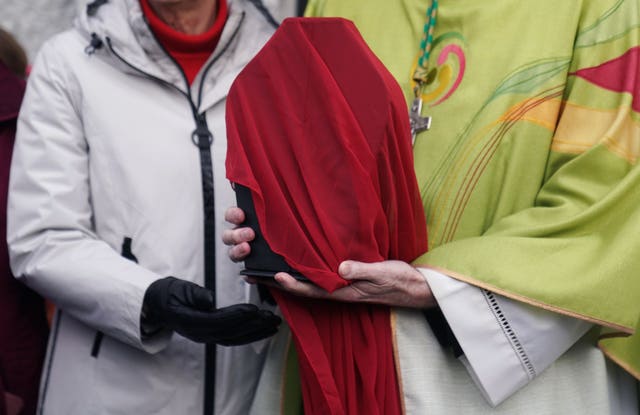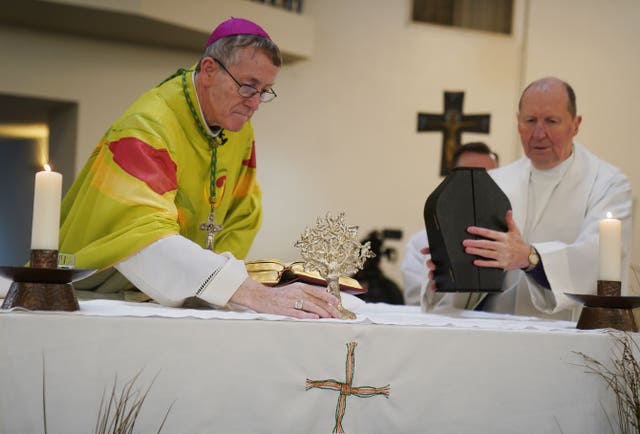A relic of Irish saint Brigid has returned to her home town after around 1,000 years away.
Hundreds of people gathered in Kildare on Sunday morning for a special church service to mark the historic occasion.
The homecoming event, which also saw a procession to the church, was held in what is believed to be the 1,500th anniversary year of St Brigid’s death.

Brigid, a renowned peace-maker, was buried beside the main altar at a monastic church in Kildare, with her grave becoming a shrine for visiting pilgrims.
Around 300 years later, when the Vikings were raiding Ireland, her remains were moved to Downpatrick Cathedral in present-day Northern Ireland for safekeeping. There they were buried in an unmarked grave alongside Saint Patrick and Saint Columba.
Over the next centuries the location of the grave was apparently lost.
According to Christian history, in 1185 the Bishop of Down prayed to God to show him the location of the three saints’ relics and a beam of light shone on a spot of the church’s floor, leading to the rediscovery of the remains.
The relics remained as a shrine at the church for the next 400 years before it was reputedly destroyed by Lord Leonard Grey, an appointee of King Henry VIII.

Despite the destruction of the shrine, the relics were apparently saved and spirited away to the Continent, with tradition holding that three Irish knights took a fragment of St Brigid’s remains to a small town outside Lisbon in Portugal called Lumiar.
That relic is still venerated in the church of St John the Baptist in Lumiar today.
A portion of the relic was brought back to Ireland in the 1930s by the Brigidine Sisters in Tullow, Co Carlow. That is now being moved to St Brigid’s parish church in Kildare, where it will be housed in a specially designed shrine.
Sunday’s event saw locals accompany the relic in a procession from Solas Bhride Centre in Tully, outside Kildare town, to the church, where a special Mass was held.
The ceremony came ahead of St Brigid’s Day in Ireland on February 1.

Kildare-based Brigidine sister Rita Minahen said the homecoming was a special day for the town.
“It’s very meaningful because we wouldn’t have a Kildare without her – Kildare owes its existence to St Brigid,” she told the PA news agency.
“The town grew up around the monastery and the hinterland and so she’s very special, she’s synonymous with Kildare.”
David Mongey, chairman of the Kildare Tourism Board, Into Kildare, said it was a “very momentous occasion”.
“It’s a homecoming of St Brigid’s relics after 1,000 years or more – she’s finally coming home to rest in her native town in Kildare,” he told PA.

Mr Mongey predicted a major boost for tourism in the region.
“I think, as a tourist body, if we think of Santiago de Compostela and the great Camino of the north of Spain, where all roads lead to Santiago, to the head of St James, the relic of St James, now Kildare has a finishing point to create pilgrim routes all over Ireland to see St Brigid,” he said.
Mr Mongey joked that the relic may also bring some luck for the county’s gaelic football team.
“We might win the all-Ireland now,” he said.
Two years ago, the Irish Government announced that a new bank holiday for the country would be named after St Brigid.
It falls on the nearest Monday following St Brigid’s Day.




Comments: Our rules
We want our comments to be a lively and valuable part of our community - a place where readers can debate and engage with the most important local issues. The ability to comment on our stories is a privilege, not a right, however, and that privilege may be withdrawn if it is abused or misused.
Please report any comments that break our rules.
Read the rules hereLast Updated:
Report this comment Cancel